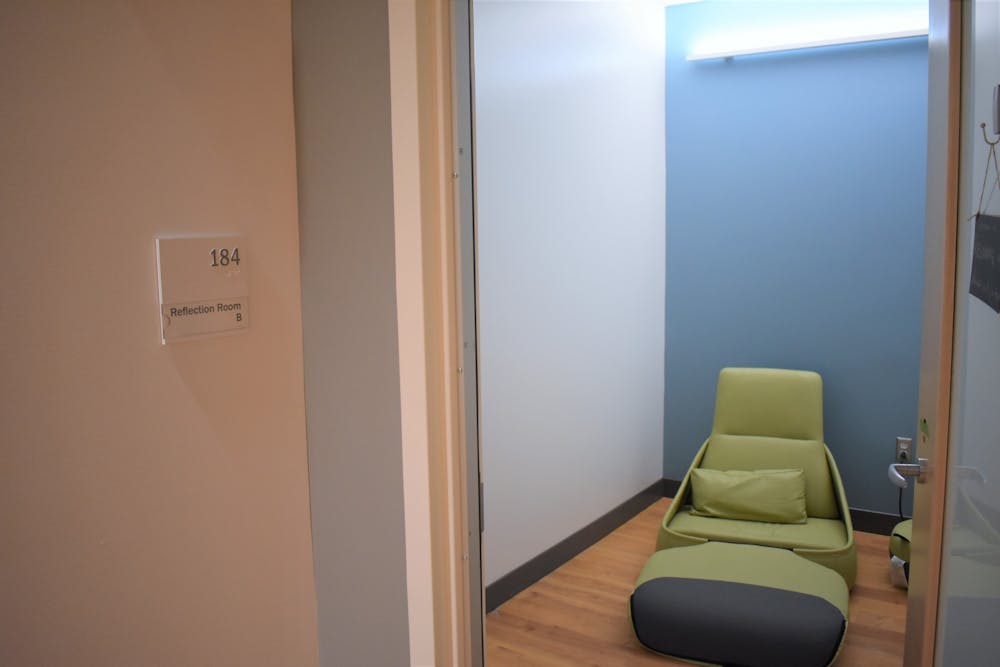Lea en español
Growing up is hard. Whether it be picking up a trade, attending college or working a full-time job, no one says quite how hard it really is. Transitioning into a college such as the University with its rigor and oftentimes intense competition can be especially difficult. In high school, the adults handle almost everything — guidance counselors help pick classes, parents typically house and feed their children and teachers provide countless opportunities to perform well. There is room for error in high school — students are often coddled. But as soon as college classes begin, that support disappears. Suddenly students are told to grow up and fend for themselves. It can be stressful — scary even — to navigate the collegiate experience alone.
Thankfully most schools, including the University, offer programs to aid their students. Counseling and Psychological Services provides mental health support through individual or group therapy, psychiatric services, drop-in consults, emergency and crisis services and more. The mission of CAPS is “to make its services accessible to as many students as possible.” As promising as this mission sounds, CAPS falls short of its endeavors. CAPS allows students to schedule therapy appointments either by phone or through the University HealthyHoos portal. And while CAPS still advertises itself digitally, its availability appears to be almost fully booked in the portal. Students have voiced their concerns about this prolonged wait time, noting that it takes weeks to finally receive an appointment spot. Further, the fact that the University has continued to ignore this issue illustrates just how unseen student needs really are.
The need for expanded mental health services is not new. In fact, it has been an ongoing issue for over a decade. Russ Federman, the former director of CAPS, testified before the U.S. Senate in 2007 for increased health resources to combat the influx of student need. Fast-forwarding to 2018, students voiced their frustrations with wait times so much so that CAPS responded by hiring additional staff. In Spring 2021, the National College Health Assessment concluded that 78 percent of undergraduate students and 87.4 percent of graduate students surveyed said they would consider seeking help from a mental health professional. There are over 27,000 students at the University and only 25 CAPS staff members who are taking patients. This translates to one therapist for every 1,080 students. Even if half of those students decided to seek help — a much lower number than NCHA suggests — it would still be infeasible. Additionally, CAPS does not operate on the weekends, shortening their appointment availability. While their website does provide a 24 hours a day, 7 days a week number to call, its primary use is for crisis and emergency consultations and fails to relieve the need for general therapy sessions.
Trying to schedule an appointment with CAPS is like going to the grocery store at the end of the day. You’re exhausted as you wait in line to checkout, attempting to balance the tower of groceries you have picked out. Except, in this case, the groceries are your accumulated mental health concerns, and instead of waiting minutes, you are waiting weeks just to reach the front.
Taking the initiative to get mental health help is such a significant personal accomplishment that is often overlooked in the public eye. Between navigating schoolwork, the lingering impact of COVID-19 and trying to make sense of adulthood, it is vital for the University to fully meet the mental health needs of students. President Jim Ryan and CAPS Director Nicole Ruzek must not only meet these needs but celebrate them. Making students wait weeks on end just to access care is far from a celebration. In-person appointment availability at CAPS must be extended to match demand. Whether it be that CAPS hires more therapists, adds appointment spots to the weekends, or both, student demands must be met. This issue has gone on for decades, and the lack of organized initiative to make a swift recovery is disappointing.
For everyone who has taken the time to contact CAPS and seek medical help, please know that your initiative and proactive nature do not go unnoticed — that is something in and of itself for which to be proud. Now, it is up to the University administration to ensure that all students have accessible and quality mental health resources and care.
Grace Duregger is an Opinion Columnist for The Cavalier Daily. She can be reached at opinion@cavalierdaily.com.







